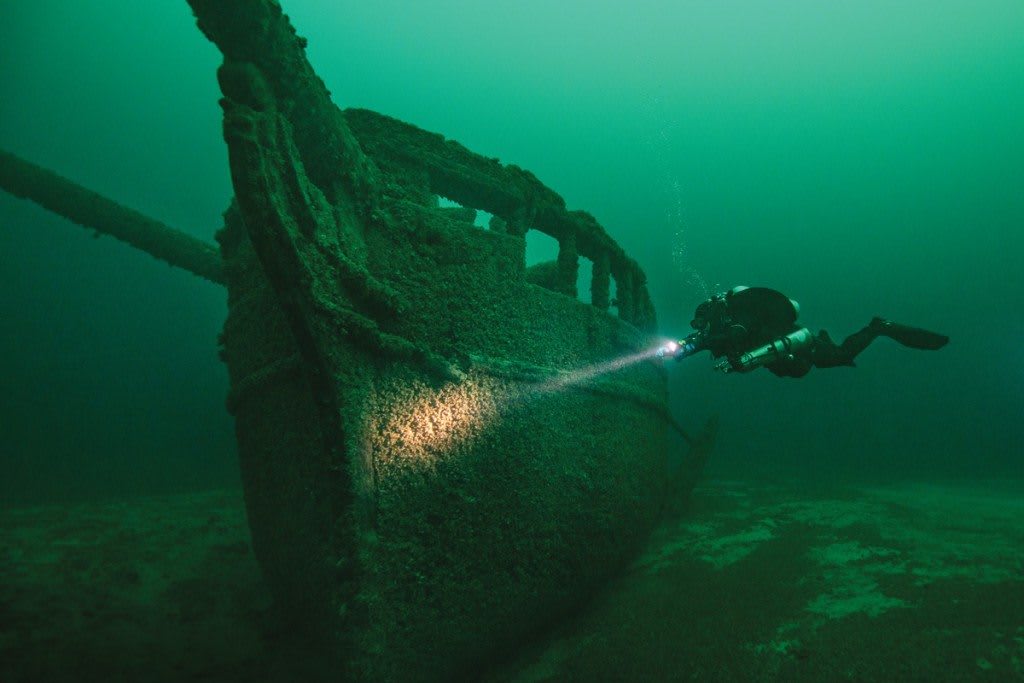Finders Keepers! Right?
Abandoned Shipwreck Ownership

Notions of sunken shipwrecks and buried treasure have long plagued the human imagination. But "does finders keepers" really apply? Who actually owns shipwrecks once they're found? Consider the case of Northeast Research, L.L.C. v. One Shipwrecked Vessel.
Richard Kullberg formed Northeast Research, LLC (“Northeast”) in 2004 for the purpose of searching the bottom of Lake Erie for old shipwrecks. He discovered a wreck of a Dunkirk Schooner submerged 170 feet in New York waters in the eastern basin of Lake Erie while searching for another shipwreck. Due to the freshwater’s cool temperature, the wreck was preserved in near pristine condition. Kullberg’s ultimate goal was to raise the wreck and place it on display in the museum in Buffalo, New York. Kullberg then filed an in rem admiralty action in federal district court seeking title to the wreck under either the law of finds or doctrine of salvage to prevent any rival salvors from diving or conducting salvage operations.
In response, New York filed an answer to the complaint asserting that the wreck is the sole and exclusive property of the State pursuant to the Abandoned Shipwreck Act (“ASA”). Nonetheless, while this was pending in federal court, Northeast was allowed by the state to identify the wreck in order to determine its owners. By determining the owners, the district court and appellate courts could determine if the ship was abandoned or not. It was unclear and debated as to the identity of the shipwreck, nonetheless, the district court found that by clear and convincing evidence that the shipwreck was abandoned and thus the ASA applied and the Second Circuit court of Appeals affirmed. Therefore, Kullberg and Northeast were not entitled to salvage rights or any compensation for the work they had already done in identifying or finding the shipwreck.
Northeast spent years and millions on surveying, searching, and identifying the ship only to walk away empty-handed. This case is just one example of an instance where shipwrecks in U.S. waters are determined to be automatically owned by the U.S. upon determination of abandonment or deemed “not abandoned” by a country through an international treaty or act. In reality, some of these shipwrecks have been lost for hundreds of years with little or no effort on the part of the U.S. or their previous owners to find the lost ships.
The Intergovernmental Oceanographic Commission, a division of the United Nations Education, Scientific, and Cultural Organization, estimates that there are roughly three million undiscovered shipwrecks scattered across the bottom of the oceans all over the world. Of the shipwrecks that have been discovered, less than ten percent of those wrecks have been surveyed and explored by divers. Historians and treasure hunters estimate that there are billions of dollars in sunken treasure around the world. However, as in the case of Northeast, finders are not always keepers.
The key factor in determining whether a treasure hunter or salvor can claim ownership or a salvage award for the wreck and its contents is if the shipwreck can be identified and determined to be abandoned. Before the passage of the Abandoned Shipwreck Act, the courts would generally apply either the doctrine of salvage or the law of finds based upon these factors. The doctrine of salvage was applied where the shipwreck is considered not abandoned and the original owner retains ownership of the ship and its contents and the salvor obtains some compensation for their services. Whereas in the law of finds, the ship is deemed abandoned and the salvor retains complete ownership of the ship and the contents of it. However, if the ship is found in U.S. waters, it is likely that either the Abandoned Shipwreck Act or another act can prevent either set of laws from applying to such abandoned wrecks. The U.S. government or government of another country will automatically take ownership and the treasure hunters and salvors will walk away empty-handed just as Northeast did.
In conclusion, whether in national or international waters, there are multiple pieces of legislation that could prohibit would be salvors from attaining ownership rights or salvage rights to a shipwreck. In national and international waters, there is the chance that if a shipwreck is deemed abandoned then neither the law of finds nor the doctrine of salvage will apply due to the ASA or an international treaty or act. Even if the shipwreck is deemed not abandoned, the doctrine of salvage may not be applied if the owner of the wreck asserts their rights and these rights are protected through an international treaty or other act of Congress.






Comments
There are no comments for this story
Be the first to respond and start the conversation.